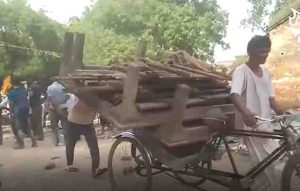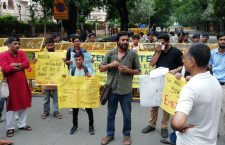Showcasing encounters as the strongest signifier of a crime-free U.P. is debatable in a state where the nexus between the law-makers and the law-breakers is so taut. The fall guy is often the one most powerless.
The battle cry of the Yogi Adityanath led government has been that of a complete crackdown on crime and a reinstatement of law and order in the state, the latest in the Chief Minister’s series of announcements declaring the state’s law and order condition as the best in the last 15 years. Encounters have been touted as one of his biggest “achievements” of this regime, with the UP government figures boasting a record of 1038 encounters till January 2018 – out of which 32 were killed, while 238 injured. While there is a fair amount of suspicion around the extra-judicial nature of several of these killings, one report even suggesting police records copied word for word, the state government has been bestowing handsome prize money on the police officers who exhibited “adamya sahas (exemplary courage)” in the adventures that led to the arrest and/or murder of dangerous criminals.
One of the strongest proponents in this series of attempts at “controlling crime” is the Uttar Pradesh Control of Organized Crime Bill (UPCOCA). First tabled by the state government in December 2017, it seeks to prevent crimes such as smuggling, illegal mining and money laundering inter alia by introducing harsher punishments as well as granting special powers to the police.
The need for such a law is an intense one in the state and of particular significance in Bundelkhand, which has been a hotbed of incessant illegal mining. The district of Mahoba, being home to large deposits of sand and stone – both of which are instrumental in construction – is a case in point. The drill has remained the same over the years of various governments and regimes: Influential industrialists from outside claim quarries through bribes, which are then run by local contractors, all of whom are in cahoots with the local police as well as the press. Capitalist greed has led to riverbeds and quarries being mined beyond their advised capacities, the profits from which are shared by industrialists and local politicians alike. The celebrated UPCOCA was introduced precisely to put an end to this practice of illegal mining, and organised crimes associated with it such as land grabbing, smuggling, extortion, etc.
But even as this contentious bill is debated on in the legislature, the state government has established an “anti-land mafia task force” to help prevent illegal encroachment and land grabbing in the time being, so as to discourage these crimes on the ground, in a more forceful and effective fashion. Designed along the lines of the infamous anti-Romeo squads, the task force comprises of the Principal Secretary, Commissioner, DM and SDM of the respective designated areas. While it has been granted significant powers and impunity in its functioning, its main purpose is to prepare a report on all illegal encroachments so that action can be taken against them.
However, this task force has become yet another tool for unleashing effective forcefulness onto swathes of the helpless poor, while the so-called land mafia comfortably go on with their lives. Not surprisingly then, the latest victims of this organised oppression are the local street vendors of Mahoba, who woke up one morning to find their shops and stalls uprooted and their wares confiscated on account of their shops being illegal encroachers. Last week, all vendors and hawkers who sold their goods on the footpath between Ala Chowk and Tehsil Crossing in Mahoba were summarily ejected from their places while their stuff was packed and taken away by the task force. A bulldozer was brought in too, to add to the fear factor. This move, which practically destroyed the lives of dozens of families, came out of nowhere – without any prior notice – and now the vendors are left completely helpless. Coming from severely impoverished backgrounds with no other means of livelihood, most of them have no other way of feeding their families.
One street vendor Jugal is still reeling from the shock as he tells us tearfully, “They should have given us some heads up, some notice – but they did nothing of the sort. How can you announce something like this one day and implement it the very next day? We should have had at least a couple of days of notice.”
Lal Chandra Saroj of the Mahoba Municipal Corporation, however, denies that the move came out of the blue. “We have been announcing it about this for almost two months now. We even told the venders personally to remove their encroachments themselves. But they paid no heed to our warnings so we had to act on it. Therefore, we announced it one last time yesterday and finally removed their wares from the street this morning.”
The fact that the vendors have not even been given an alternate place to conduct their trading – a necessary prerequisite for removal of street vendors – is being considered non-existent fine print by the authorities. Considering that the idea behind the task force was to curb the rampant land mafia of the state, going after helpless street sellers with such brute force seems somewhat unwarranted. As an anguished looking sabziwala Deepak, says, “I have been here for the last 10 years, and yesterday, they suddenly announced that we all have to leave. They even came and physically removed us today! Where do we go now? I had brought fresh vegetables worth 15000 rupees just this morning, and now I have lost everything.”
This Khabar Lahariya article first appeared on Firstpost.


